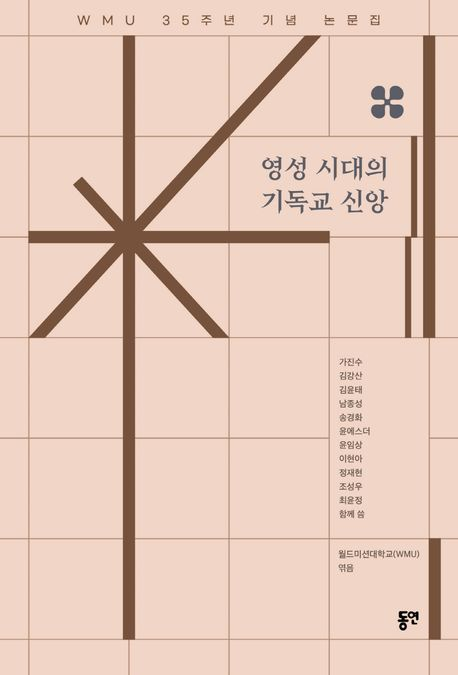
One of the defining characteristics of our time is rapid change. The emergence of AI and the metaverse is ushering humanity into an entirely new future. Yet alongside these technological advances, we are also experiencing profound spiritual emptiness and a crisis of identity.
The theme of “spirituality” is no longer limited to individual faith. It has emerged as a vital discourse shaping the values of communities and society as a whole. Spirituality is essential not only for personal devotion, but also for nurturing the collective conscience and moral fabric of our world.
This new volume is a collection of essays exploring creative and practical approaches to faith formation for the next generation—particularly Korean and Korean-American Gen Z and children in both Korea and the United States. Eleven authors contribute insights on a wide range of topics, including children’s worship, ministry for traumatized children, faith formation in Korean-American households, ministry with children with disabilities, identity among immigrant youth, preaching styles, pastoral responses in the age of AI and the metaverse, and the role of classical music in worship. Together, these essays propose pathways for cultivating spirituality among the rising generations.
Jinsu Gah
Chair of the Department of Worship, World Mission University; Director, Gloworship Ministry
Kangsan Kim
Associate Pastor, New Jersey Praise Church; Independent Researcher
Yuntae Kim
Director, Ph.D. Program in Pastoral Missiology, World Mission University; Senior Pastor, Shinsung Church (Daejeon, Korea)
Jongseong Nam
Dean of Undergraduate Programs, World Mission University; Director, Asian-American Spirituality Center
Kyungwha Song
Chair, Graduate School of Counseling Psychology, World Mission University; Director, Korean Christian Counseling Center
Esther Yoon
Director, Doctoral Program in Music Performance, World Mission University; Instructor, California School of the Arts – San Gabriel Valley
Imsang Yoon
Chair, Department of Music, World Mission University; Artistic Director & Conductor, LAKMA Philharmonic Orchestra & Chorale
Hyunah Lee
Professor of Social Work, World Mission University; Director, Well-Tech Collaboration Center; Director, DS Lim Foundation
Jaehyun Jung
Former Distinguished Professor, World Mission University; Special Professor, Yonsei University Academic Affairs
Sungwoo Cho
Ph.D., Graduate Theological Union (Berkeley, CA); Pastor for English Ministry, Bethany Presbyterian Church (PCUSA)
Yoonjung Choi
Vice President, World Mission University; Director, PCCE
World Mission University (WMU), located in Los Angeles, is a premier Christian university founded in the Korean-American community. Students from across the United States and around the world come to study at WMU. Undergraduate programs include Christian Ministry, Christian Counseling, Music, Nursing, and Social Work. Graduate programs offer degrees in Divinity, Theology, Global Leadership (specializations in Welfare Missions and Coaching), Counseling Psychology, Music, and Worship Studies. Doctoral programs include the Doctor of Ministry and the Ph.D. in Theology.
Website: https://kr.wmu.edu | Tel: +1 213-388-1000
“The civilization and culture of our world are rapidly advancing into the age of artificial intelligence. We live in a time where nothing seems impossible. Yet the church holds a unique power the world cannot offer—its spiritual dimension. While many aspects of church life may be shaped by culture, spirituality can never be supplied by the world, no matter how advanced. Where, then, does the spirit take shape and how does spiritual strength grow? The answer lies in worship. True spiritual power is formed through the essential elements of worship: the Word, prayer, and praise. Nothing else can produce or sustain it. Worship is thus the heart of the church—the source from which all other ministries flow.”
— From Jinsu Gah, “Contemporary Church and Children’s Worship”
“When complex trauma occurs in situations that are inescapable or prolonged, the family environment cannot be overlooked. Children and adolescents, being minors, cannot easily ‘escape’ their homes. Abuse or neglect may occur, but more subtle patterns—contemptuous language, cold or rigid parents, lack of affirmation, perfectionism, absence of parental presence, or family conflict—can also result in chronic wounds that leave deep scars. Roberto Assagioli described such experiences as the ‘original wound,’ often leading to lasting psychological consequences. In many cases, these wounds resemble the symptoms of complex trauma experienced from childhood.”
— From Kyungwha Song, “The Role of the Church in Preventing and Healing Childhood Complex Trauma”
“Currently, an estimated 45 million people in the U.S. live with disabilities, of whom about 3 million are children. This represents 4.3% of the population under age 18. Cognitive difficulties are the most common, followed by independent living difficulties among older adolescents. Many children live with multiple disabilities, creating even greater challenges. The church and family must work together to nurture faith formation among these children—particularly through family worship as a central practice.”
— From Hyunah Lee, “The Role of the Church and Family in Faith Formation for Children with Disabilities”
“Where should preaching begin? Many assume that expository preaching begins directly from Scripture. Indeed, Scripture is the Word of God, but the Bible itself is also the result of centuries of lived experience, interpretation, and confession within faith communities. Scripture is, in essence, encounter—an experience that calls forth interpretation, response, and testimony. Preaching today must draw upon this dynamic, connecting the Word with life.”
— From Jaehyun Jung, “From Context to Word: Toward More Effective Preaching”

